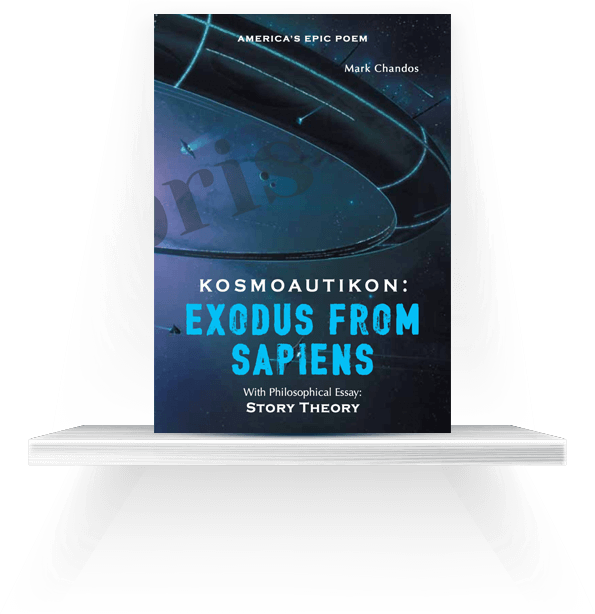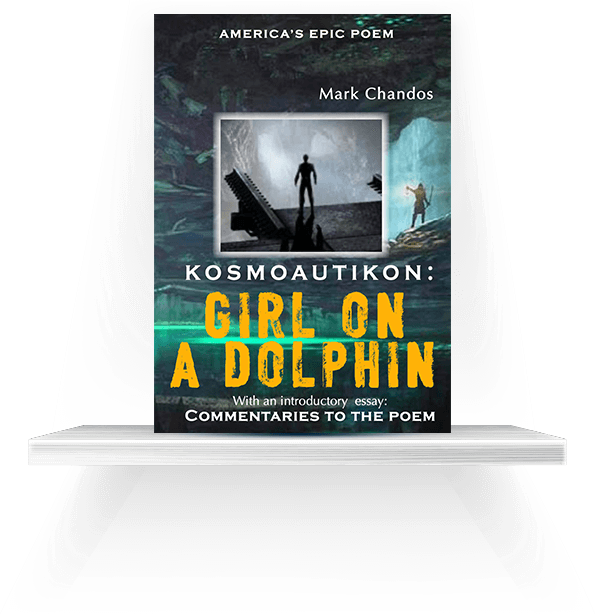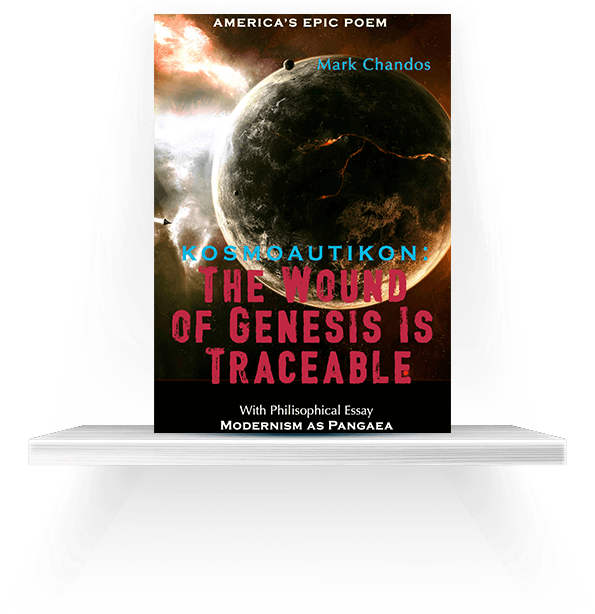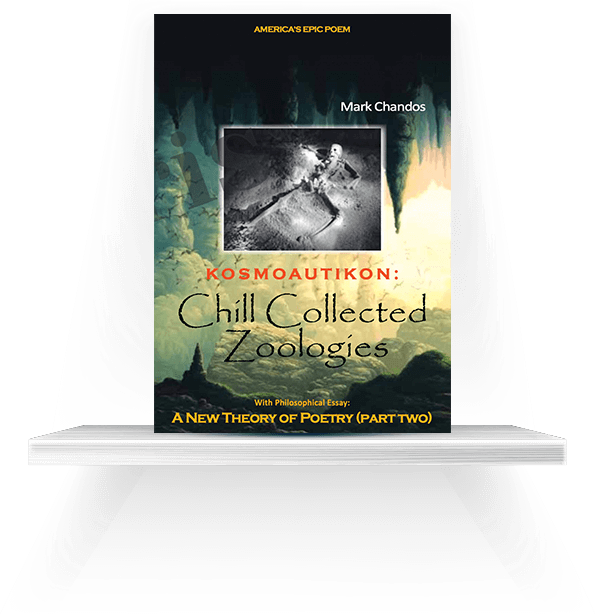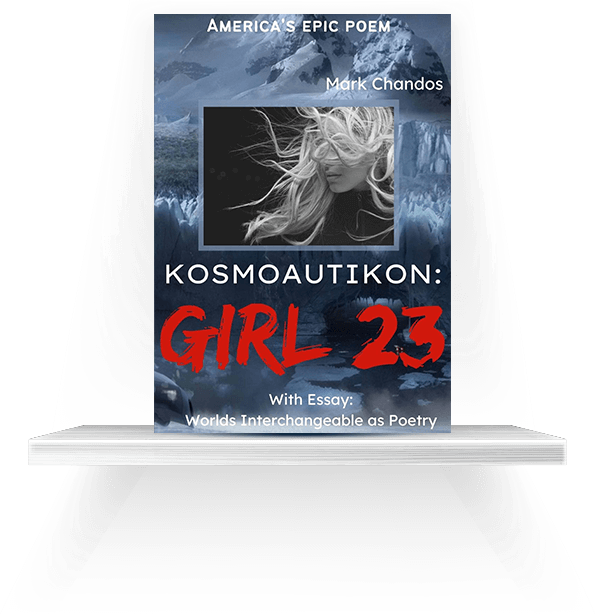Story Theory is a means to evaluate the overall path of the mind of Homo sapiens. It arose from the necessity of a single interrogative: How may science and poetry be equal means of prestigious and
cherished information? How may stories, epic poems, and sacred myths (that have no archeology) have as much, or more power over the human mind than the ideology of science?
In my thesis, the schism in Western societies between poetry and science, between vernacular speech and scientific speech, is a dangerous fallacy.
It is an illusion that can be dispelled. If true, what is the philosophical link between opposing categories of human information? Is the idiom of scientism a true reality – or is prophetic voice (spoken in the epic trope) a true reality? Which one contains superior information of the human condition? When looked at closely, and each idiom is reduced to its basic component, it will be seen they are very much alike in construction. They are linguistic twins. They are imaginative inferences using symbols. If we could show this link (both being forms of poetry), then there would be a new philosophy to unify these two opposite idioms – that is, objective scientism and subjective poetry. As will be seen, there is no such thing as objectivity in the human case. Objectivity is a linguistic illusion.
The urgent need of our time is for a coherent view of life, at the same time spiritual and practical, that can bring philosophic clarity to the harmful balkanization currently predominate in human experience. Unity of conceptualization may lead to clarity of what is human. I will follow the logic of Story Theory, the subject of this book, to see where it leads, no matter how alien the landscape. The conclusion, if the reader has the patience to reach the end of the commentaries, leads to a staggering new vision of Homo sapiens. The alien constituent is deep in our genome.
I saw early in my study that science, like poetry, was a hermetically sealed, self-referent linguistic codex. I felt there was a problem with modernism. I saw that each human civilization, also, was a self-referent linguistic codex. We may contrast the major philosophies of human civilizations. Scientism could never give a just explication of Islam or Judaism. Christianity or Buddhism could never conform to the precepts of science – and still operate. All sets of human civilizations, thus, are nomads to each other. The point? There was no method to evaluate the position or intent of the self-conscious mind of Homo sapiens outside of separate, and warring, specialized idioms. This was inefficient.
After all, are Christianity, Islam, Judaism, or Buddhism able to correctly evaluate all other –isms – all other faiths – all other civilizations? Are science, physics, and psychology able to discover the final answers of life – or the origin of self-consciousness? We know the answer. No. Science is only able to detect science. Psychology is only able to detect psychology. Taxidermists are only able to detect taxidermy. And so on. Each is a linguistic system anticipating its own self-referent sets of discoveries.
Active in remote sections of the globe, and learning many languages, I saw that scientism was not hegemonic in all parts of the human universe. It worked only where other like-minded men accepted the same definition of scientific words and concepts. Outside of Western urban centers, science was
seen as an alien and hostile confusion of corrupted, prejudiced, and toxic belief. Slowly, hesitantly, I looked for evidence of the false data of scientism.
In Saudi Arabia and Afghanistan I was looked upon as an alien being belonging to the most dangerous and malefic of civilizations. For a moment, I tried to see what they saw from within their idiomatic perspective. With experience, sometimes bitter, I was able to detect the false sets of modernist data in advertisements, on the walls of the ghettos, in the fake data of medical studies, and in the gaping vacuity in the hearts of Western citizens.
The chief requirement of Story Theory, therefore, is that it functions as a test of the mind of Homo sapiens. Something so unlimited, so sophisticated as human intelligence, so complicated in its operation, must have a pattern of intent, causation, and target objective. Story Theory, therefore, functions as a macro check of the intent and force of human consciousness. It raises the question: Where, outside of specific, narrow civilizations, is the mind of Homo sapiens properly positioned – and with what moral trajectory is it determined on (within the self-conscious limit of perception)? If a leviathan as the human mind cannot be mapped or evaluated in the macro – then what is the use to make a collection of idioms of civilization, each contradicting the data sets of the previous one, stacked on top of each other, millennia after millennia? By any contest of sobriety, millennial waves of alternate denying and contradicting civilizations, as a way of human mental congress, are a form of madness.
Without Story Theory humans are merely shadowboxing with their mind. I saw that civilized man, at best, was merely a specialist in his chosen idiom. Each civilization explored a particular idiomatic tract of thought – a rich branch of human imagination. Each civilization only proved it loved its own linguistic idiom – being barbaric to all others. That is, each civilization was deep into its own chosen narratives of the possible material or spiritual interpretations of universe. I saw that each civilization made deep advances into their own particular and focused – if narrow – innovations of speech.
Science, so sure of its empirical proofs, is an idiom not accepted by Islam. Islam, so sure of its spiritual proofs, is denied by Hindus and Christians alike. All civilizations, in this perspective, are disparate and contradictory, yet intricate, poems. Each civilization, in effect, is a separate theory of poetry.
That is the insight of Story Theory.
The usual examples come to mind. The Greeks innovated deeply in philosophy. Perhaps unique in the ancient world, they constructed the linguistics of complex philosophic thought. The Muslim, the Jew, and the Christian each had their doctors of divinity and were certainly fluent in the most esoteric level of metaphysical exploration and exegesis of prophetic voice (scripture). Tengrism in Mongolia, Plains Indian religion of the American Plateau, or Voodooism in Africa, so dissimilar to Western religions, have deep shamanistic roots and profound animal totems, seamlessly interacting with the natural environment. Each seemed to be totally self-sufficient and the acolytes of each never felt in anyway inferior to any other human idiom. None of these civilizations showed the slightest regret or debility that they did not possess the mathematical machines and toxic chemicals of modern states. Did the great religions have a great product? Did they make a great discovery? A great machine? Yes. Ethical and moral behavior. It has allowed the human world to operate with ferocious efficiency for twelve millennia. The grand achievement of religious and shamanistic cultures, though diverse,
represented organized linguistic totems, consisting of human moralities and
ethics that science can only look at with bemused speculation of their deep
uncanny origins.
Modern men have likewise made a new house of speech – a new poem of civilization – a deep idiom of math, kinetic technology, and physical science (henceforth called scientism in these books). Yet, in the end, each of these great idioms (religion/philosophy, science/modernism, etc.) are not macro tests of the human mind; they are only idioms of highly focused specialties of diverse linguistics – merely opinionated interpretations of human civilization. How to test each against the overall evaluation of Homo sapiens’ self-conscious mind?


